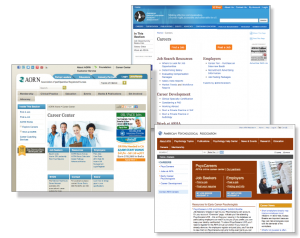Navigating a Career Transition
Career development is one of the top areas of interest for continuing education in many associations and content on the topic can serve as a tangible member benefit that helps prove the value proposition for those associations.

Michelle Mason, CAE, FASAE, CQIA , president and CEO of the Association Forum of Chicagoland and Frank Rudd, CMP, CAE, president and CEO of the Florida Society of Association Executives both recently went through career changes and offered tips on making a smooth transition.
In addition, Alex DeBarr, president and CEO of Naylor Association Solutions offered tips on ways associations can provide the kind of content that those in transition are looking for.

Associations provide many opportunities for the career development of their members. That information is often provided through:
- Continuing education
- Webinars
- Magazine Content
- Networking
- Career Centers
- eNewsletters
- Mentoring Programs

While many associations outside industry focused training, DeBarr said that few have developed a career-focused content strategy. In order to launch a career-focused association content strategy, DeBarr suggested content ideas including:
- Career Transition
- College Career
- Early Career to Middle Management
- Middle Management to Executive
- Late Career to Retirement
- Succession Planning
- Mid-Career Change
- Deciding on the right career path
- Identifying opportunities for advancement in your industry
- Monitoring employment trends
- Value of certification
- Effective strategies for recruitment through associations
- How to manage professionals in your industry
- Professional development needs for your industry – certification, continuing education

DeBarr said that strong career content can create greater member engagement, increase traffic to your website and career center and be an example of a tangible member benefit that can improve your value proposition.
Rudd, who has been in his current position for 16 months, said that the impetus for his career change was a chance to re-ignite his passion. With a degree in business with a focus on association management from Florida State University, Rudd said his lifelong career aspirations have been for association work.
After more than a decade with his former association, though, Rudd was looking for a new challenge. He suggested several points he said were important to consider as you navigate your career path:
- Develop Mentors – both inside and outside your field
- Do all you can do to differentiate yourself in your profession
- Accentuate the things that make you unique
- Get all the accreditations you can
When transitioning into a new role he said that executives should:
- Jump head first into the financials
- Figure out the power people – both on staff and in your membership
- Make changes sooner than later
- Find out the reason your organization really exists and become an expert on those issues
For Mason, a new role meant a first time experience as a CEO. She’s now been on the job for 11 months and says the one thing she underestimated was the importance of culture.
She said that as an association executive it is critical to support members in their career journey and listening to members about their needs is key. Mason said they pay dues, they have a network and they will remember if you were a connector to career resources.
DeBarr added that associations should be serving as the leading source of information, serving as a mentor to your industry. This is especially important to the millennial generation, he said, as career development can serve as a huge benefit.
For those considering a mid-career transition it’s important to consider what incentives are most important. That may not be compensation.
“Whether we know it or not there’s a time clock on our positions,” DeBarr said. “Maybe you’ve done everything that you can do and it’s time to move on.”
He added that it’s important to watch staff members who may also be hitting their own plateaus and be prepared to offer your rock star staff new challenges and incentives to keep things fresh.
What are you doing to provide career guidance to your members? What about your staff?
Elsbeth Russell is a senior content strategist with Naylor Association Solutions.

